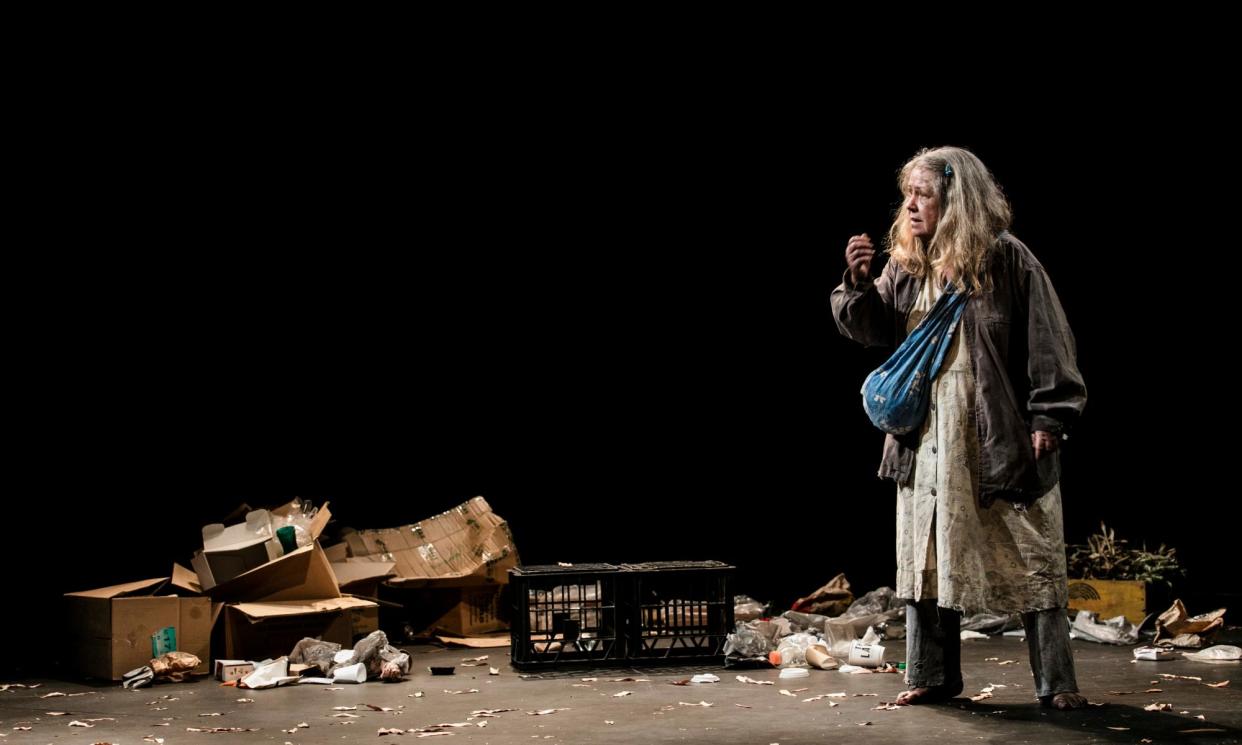Mother review – is this a devastating character study or trauma porn?

As the audience files into the room, chatting and sipping glasses of wine, a woman is already on the stage. She shuffles around, muttering, twitching, fidgeting. Her back is to the audience; whoever she is talking to is not here – if she’s talking to anyone at all. Dead leaves litter the ground. Rubbish, milk crates. The lights dim, she turns, and she begins to speak.
The play is Mother and Noni Hazlehurst is Christie, a homeless woman telling the story of her life. Christie has struggled with mental illness, substance abuse and unstable interpersonal relationships, particularly with her husband, Lenny, and their baby, named after his father but whom she secretly calls Beau.
Ghosts haunt the story, especially the spectre of Beau. Christie is physically alone but her mind is ravaged with these events from decades ago. Over 70 minutes she narrates her story, crawling ever closer to a single, shattering moment.
Related: Three things with Noni Hazlehurst: ‘I bought $10,000 of gold coins and never saw them again’
Hazlehurst first played this role – which the Melbourne playwright Daniel Keene wrote for her – in 2015. At this point Christie is a lived-in character. Hazlehurst inhabits her with a pained, animalistic yowl, a fiddle with the hair.
The character is hardened from the streets; she is angry at the hand that life has dealt her, and Hazlehurst spits these lines with feral rage and stoic, dry humour. But when Christie speaks about Beau – about the hope this little baby gave her – Hazlehurst is all tenderness, her facial expressions and voice soft as silk.
One aspect makes the casting particularly effective: the actor is, of course, known to a generation of Australians as one of Play School’s sunny hosts, a job she held for more than 20 years. Through Play School she was a kind of mother to many of us: a teacher, a nurturer, a carer. The only things separating that character and this one are circumstance, bad luck or both; older women, after all, are the fastest growing demographic of Australians experiencing or at risk of homelessness. “Who knows what I might have been, or who I was once upon a time,” the character says. We feel it all with her.
The sparseness of the show’s design adds to Mother’s intimate, claustrophobic nature. Kat Chan’s costuming is simple but realistic, down to the dirt on Christie’s feet. A moment where Tom Willis’s lighting bathes radiance on to Christie during Beau’s baptism promises a kind of rebirth that never happens. Darius Kedros’s sound largely focuses on the birds surrounding Christie, cawing and cooing, eventually becoming indistinguishable from her baby’s cries. In the show’s final minutes, as Hazlehurst stands still, César Franck’s haunting cello sonata plays: a requiem for the living.
Yet for all the artful craft of this production, there is also an unshakable unease. While stories like this can certainly evoke empathy, the idea of trauma porn kept coming back to me. There is no end to Christie’s torment – her story is so harrowing, so painful, that to bear witness to her suffering feels voyeuristic, almost violent.
Keene’s lyrical writing is undoubtedly beautiful, and Hazlehurst’s acting is masterful: her rendering of Christie’s deep shame and sorrow lands somewhere in the gut. It feels wrong to leave her – to walk back out into the streets where so many real people like her wander with no one to listen or care. For them, there is no poetry, no theatre – only life.
Mother is at Fairfax Studio, Arts Centre Melbourne, until 21 September


